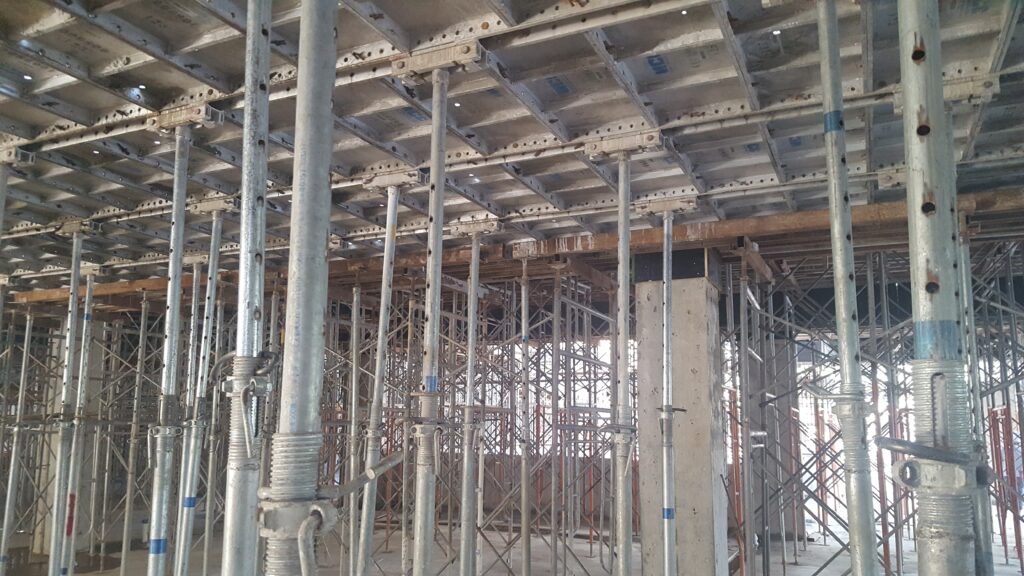Formwork systems play a pivotal role in the construction industry as they are used to mold cast-in-place concrete into desired shapes. There are different types of systems available depending on the material used – the two primary ones being timber formwork and aluminum formwork systems. Both these types are lightweight compared to traditional steel formwork, which makes them easy to transport and install on construction sites. However, their properties are quite different, making one suitable over the other for specific applications or project requirements.

Before choosing between aluminum and timber formwork, it is important to do a comparative analysis of both so you can understand their unique features and suitability for different construction needs. The following aspects highlight their difference:
1. Weight
Both aluminum and timber formwork systems are lightweight. However, aluminum formwork can be slightly heavier. Still, they are easy to handle and transport compared to steel formworks.
2. Durability
Aluminum formwork systems are much more durable than timber ones. Timber formwork is susceptible to termites, rot, and other deterioration over time due to exposure to weather elements. Aluminum formwork, on the other hand, can withstand challenging site conditions and last longer with proper maintenance.
3. Efficiency
The assembly and dismantling of aluminum formwork are faster than timber formwork due to its interlocking panel system. This enhances productivity and efficiency on construction sites. Timber formwork requires more labor and time for assembly and stripping work.
4. Cost-Effectiveness
For small to medium-scale projects, timber formwork is generally a cheaper option than aluminum. However, for large projects involving repetitive concrete work, an aluminum formwork system proves to be more cost-effective. This is because the initial high cost of aluminum formwork is compensated by its reusability and efficiency.
5. Flexibility
Both materials allow for flexibility in design. Timber formwork can be customized according to specific project requirements by cutting them on-site. Aluminum formwork comes in standard sizes but can still be adapted across different projects with proper modifications and renovation.
6. Concrete Surface
Aluminum formwork provides a very smooth concrete surface due to its non-absorbent panels. Timber may leave intricate grain textures or irregularities on concrete.
7. Reusability
Aluminum formwork can be reused multiple times with proper repairs and maintenance. Timber formwork, on the other hand, has low reusability because of its short lifespan and deterioration over time.
For small projects with short durations, both timber and aluminum formwork systems prove to be suitable choices. Timber formwork is cost-effective due to its relatively lower initial investment, while aluminum formwork also offers cost savings since it can be bought back or recycled.
For projects that span over longer construction timelines, such as complex commercial buildings, hospitals, or highways, aluminum formwork out-beats timber. It offers the durability required over an extended period. Similarly, multi-tower residential or mixed-use developments harness the reusability of aluminum formwork to pour repetitive structural elements efficiently. Because of their longevity even in changing site conditions, aluminum formwork systems are particularly suitable for projects that involve phases carried out over multiple seasons.
GETO is a leading and experienced formwork company that specializes in providing aluminum formwork solutions. Headquartered in Guangdong, China, we have 12 domestic and international production bases with an impressive combined annual manufacturing capacity. We offer a wide range of formwork systems, climbing platforms, and precast concrete components. At GETO, our team is committed to quality, customer service, environmental protection, and social responsibility. Our advantages include:
Our aluminum formwork systems can be used to construct common structural elements like floors and basements of residential buildings. Some examples are high-rise apartment complexes, office towers, and hotels. Our formwork solutions are also suitable for portions of public infrastructure like bridges, tunnels, underground utilities, and railroads. The durable and reusable systems facilitate the rapid construction of repetitive concrete sections across different project types.

Both aluminum and timber formwork have their respective qualities. For large and complex construction projects, aluminum formwork proves more practical and efficient compared to timber, thanks to its above-mentioned unique advantages. At GETO, we offer high-quality aluminum formwork solutions customized for various structural requirements. With years of experience, robust in-house R&D, and strict quality standards, we have become a trusted name in the industry. Visit our website to explore our dependable building formwork solutions.